Over the past several weeks, we’ve shared what we mean when we say “inclusion is political.” We’ve landed on the fairly open concept that inclusion requires advocating for people who are excluded (socially, economically, politically), in various settings, with varying tactics and goals. We’ve concluded in each post that inclusion is not a passive ideal or goal. Rather, it’s a mindset that leads us to take action.
And right now, with five days until the midterm elections, we have an opportunity to take action on the local, state, and federal levels. We have an opportunity to advocate by checking the powers that be on the ways in which their policies do not work for marginalized people—by supporting candidates who stand for people, for inclusion, and for equity.
That opportunity is a privilege, not just in comparison to non-democratic countries, but in relation to those in our own history who have fought for the right to vote, and those in the U.S. who remain disenfranchised today.
Over the past few weeks, there has been a deluge of news coverage around the hundreds of thousands of voters purged from the rolls in Georgia. This situation has led to a broader conversation in the media around voter suppression, the targeting of people of color, and the way these processes shape our democracy.
The message? A vote is a powerful tool for declaring and demanding full agency and representation in our government, and for disrupting an exclusionary status quo. There are people who see that power as a threat; this has always been the case.
A vote is a powerful tool for declaring and demanding full agency and representation in our government, and for disrupting an exclusionary status quo. There are people who see that power as a threat; this has always been the case Share on XThis past weekend, I had the opportunity to visit the Equal Justice Initiative’s (EJI) Legacy Museum and National Memorial for Peace and Justice in Montgomery, Alabama. The museum follows the legacy of slavery and racial terror throughout history and into the present-day system of mass incarceration. The memorial is dedicated to the more than 4,000 victims of racial terror lynchings that took place at the hands of White mob vigilantes between 1880 and 1940. The visit was a heavy one, but the stories told at the museum and the truth made plain in the monument offer us an opportunity to be honest about the history of who we are as a country and the impact that history has on us today. As EJI articulates it, “Avoiding honest conversation about this history has undermined our ability to build a nation where racial justice can be achieved.”
The museum traces our racial history from slavery, to lynchings and other terror tactics of social control, to the death penalty and mass incarceration. The hard, terrifying, sobering—and, for some, all too recognizable—reality that echoes throughout is that White people in this country have done whatever it takes throughout our history to maintain social, political, and economic control over people of color – from Native Americans, to enslaved Africans, to African Americans, to Central/South American and Asian immigrants. And the progress we have seen has been hard fought for through resistance that at times has proved, and still today proves, deadly.
The brutality of that fight sends the same message: voting is a powerful tool. It’s so powerful that it threatens those looking to maintain control at the expense of a truly inclusive democracy. It’s so powerful that White mob violence was used to keep Black people from the polls, and powerful White men (and women) continue to create barriers that target communities of color—like gerrymandered districts, voter ID laws and limited early voting.
While we believe it is a right to vote in this country, it remains a privilege. Those of us who have that privilege have the power to change that – if we use it.
While we believe it is a right to vote in this country, it remains a privilege. Those of us who have that privilege have the power to change that – if we use it. Share on XAs Representative John Lewis put it:
I have been beaten, my skull fractured, and arrested more than forty times so that each and every person has the right to register and vote. Friends of my gave their lives. Do your part. Get out there and vote like you’ve never voted before. #vote #goodtrouble
— John Lewis (@repjohnlewis) October 22, 2018
Regardless of your political opinions, voting is about being an engaged member of a community and working to make it a place where people can live their best lives. “Getting political” is not divisive, but rather a practice of finding common ground and common solutions to systems of power that have and continue to exclude. It is about being willing to acknowledge that we have a role in governing ourselves and caring for one another. It’s about recognizing that we all have a sphere of influence and can use it to create inclusive spaces, even, and especially, in the midst of polarization. “Getting political” is about advocating for people by any means available to us, within the avenues available to us.
“Getting political” is not divisive, but rather a practice of finding common ground and common solutions to systems of power that have and continue to exclude. Share on XWhether it’s at the dinner table, in the workplace, on social media, through our consumer habits, or at the polls, we have opportunities each day to be bold and stand for active inclusion. We can have conversations where we listen and find common ground; we can form committees and plan policy changes; we can be intentional in how we spend our money and whom we support; we can support people as they develop a greater capacity for empathy and understanding; and we can provide the necessary checks on our government at the ballot box.
Consider these questions as we approach the midterm elections and as you continue on your journey to #LiveInclusively:
- Who makes up my community? Who is included? Who is excluded?
- What does inclusion look like in my community? Exclusion?
- What are the roots of exclusion in my community? (e.g. laws, norms, inequities, etc.)
- Who (on the ballot) is advocating for those who are excluded?
- Who (on the ballot) do I believe will work towards widening the circle of inclusion in my community?
- What is my role in working towards greater inclusion in my community?
- How will I hold my community members and representatives accountable?




















